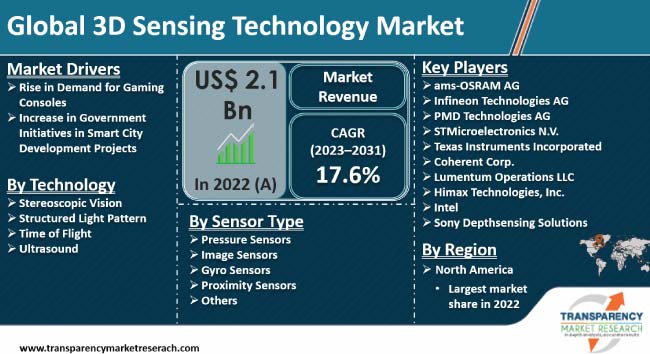Global 3D Sensing Technology Market Expected to Reach USD 4,742.5 Million by 2026
The global 3D sensing technology market was valued at US$ 831.1 Mn in 2016 and is projected to register compound annual growth rate (CAGR) of over 19.16% from 2018 to 2026, according to a new report published by Transparency Market Research (TMR) titled “3D Sensing Technology Market – Global Industry Analysis, Size, Share, Growth, Trends, and Forecast, 2018–2026.” The report suggests that rising use of 3D sensing technology across automotive, consumer electronics, and media & entertainment industries worldwide along with the rising trend of using technology such as augmented reality or virtual reality around the globe is likely to spur the demand for 3D sensing technology in the coming years. As key players introduced 3D sensing technology in developed markets such as North America, Europe, and Asia Pacific, these regions are likely to account for dominant share of the global 3D sensing technology market. Growing demand for 3D sensing technology from next generation smartphones in emerging markets such as China, Japan, and India is likely to boost growth of the Asia Pacific 3D sensing technology market at a growth rate of around 18% from 2018 to 2026.

Request a PDF Sample -https://www.transparencymarketresearch.com/sample/sample.php?flag=S&rep_id=39959
Heavy maintenance cost of 3D sensing technology related components and devices to affect the expansion of 3D sensing technology worldwide
Application of 3D sensor technology is expected to expand across multiple industry verticalssuch as consumer electronics, media & entertainment, automotive, and security & surveillance, providing novel opportunities in the field of 3D sensing technology. However, some restraints can have a negative impact on the growth ofthe 3D sensing technology market. 3D sensor has high cost of maintenance due to the complex circuits used in the VCSEL (Vertical-cavity surface-emitting laser) technology.This could be a major factor that could hamper the growth of the 3D sensing technology market. However, many manufacturers are planning to increase the production of 3D sensors due to continuously growing demand, which could overcome this restraint in the near future.
Get Table of Content @ https://www.transparencymarketresearch.com/report-toc/39959